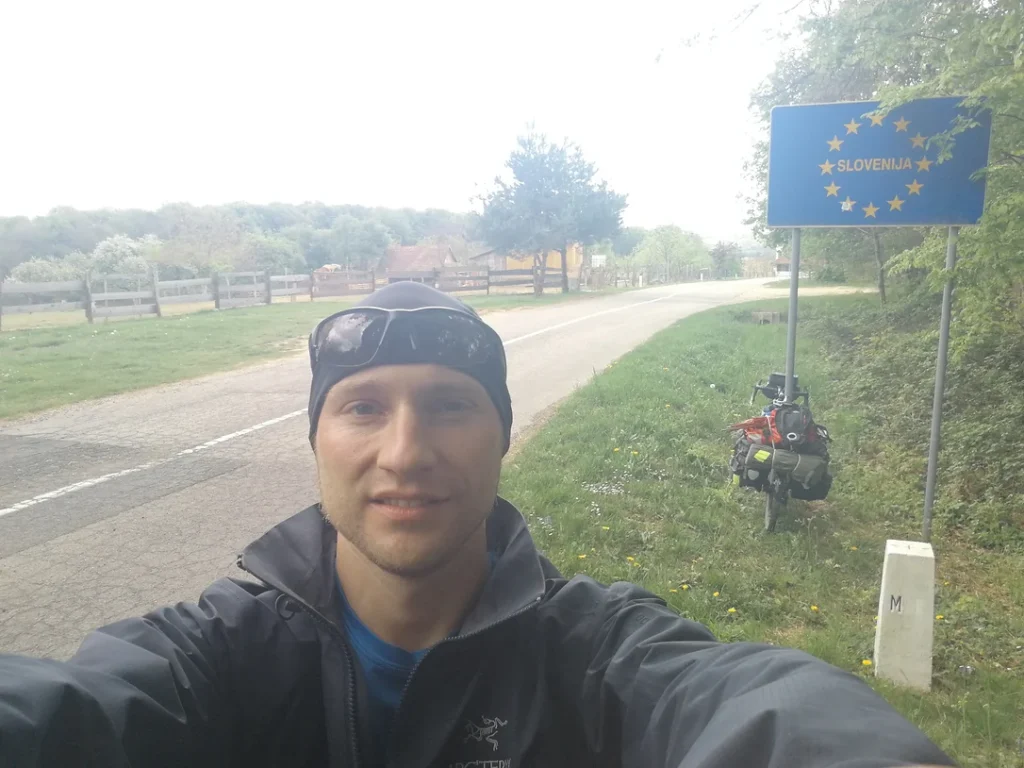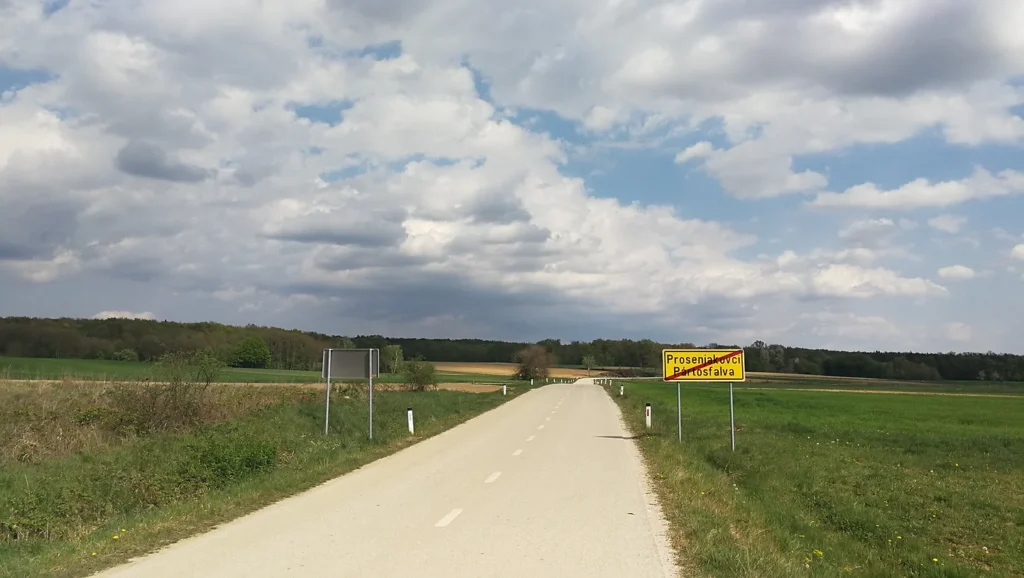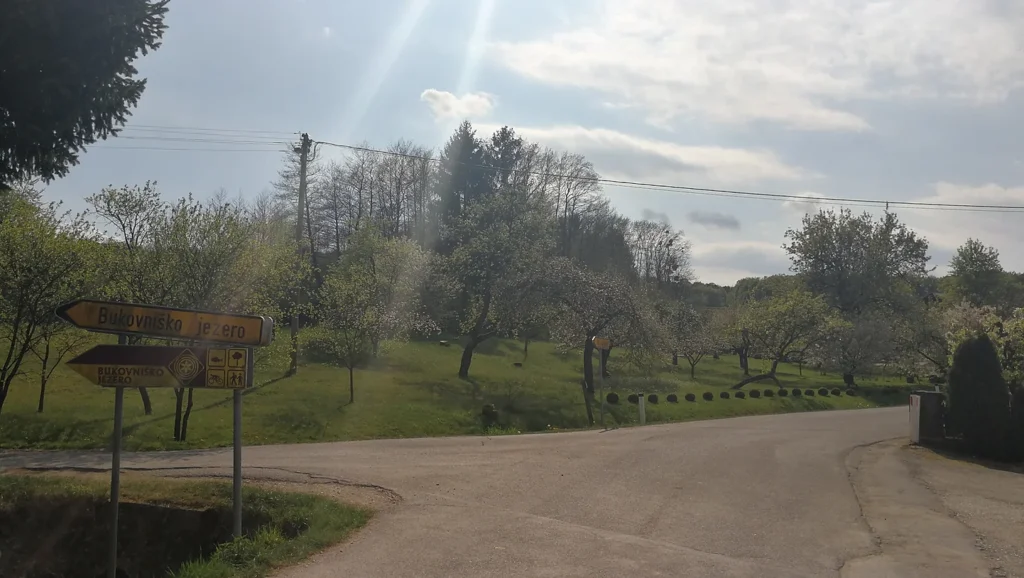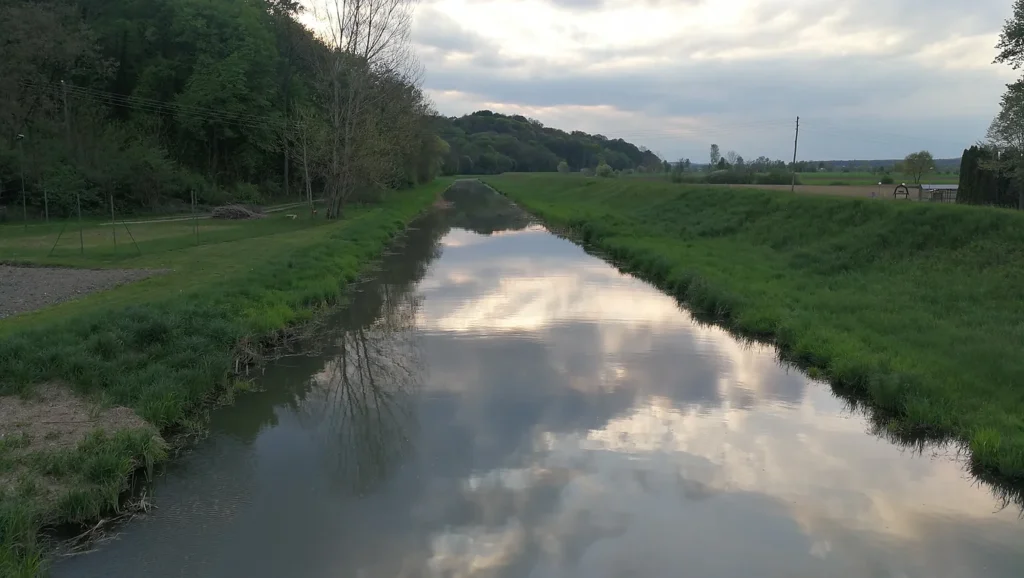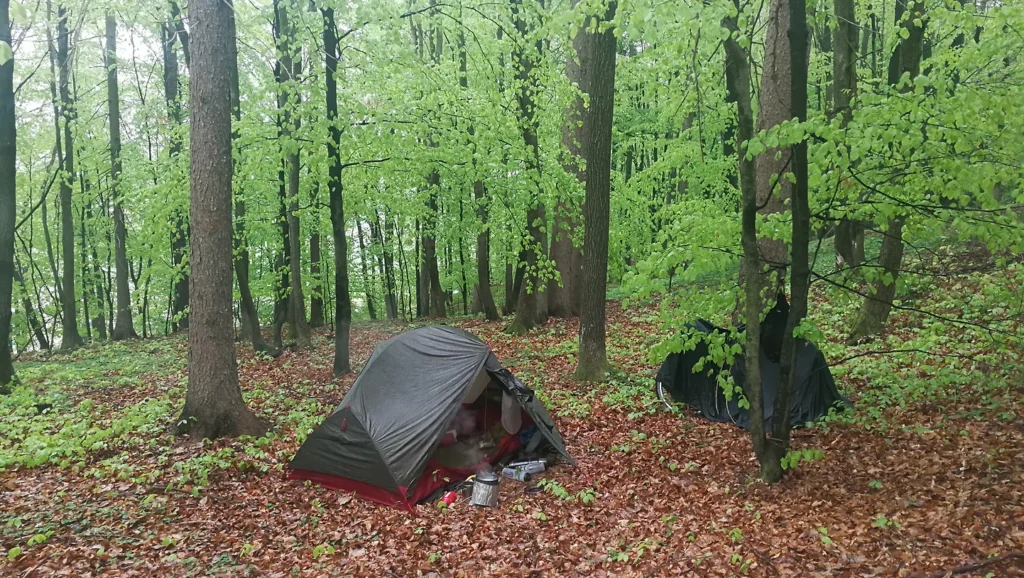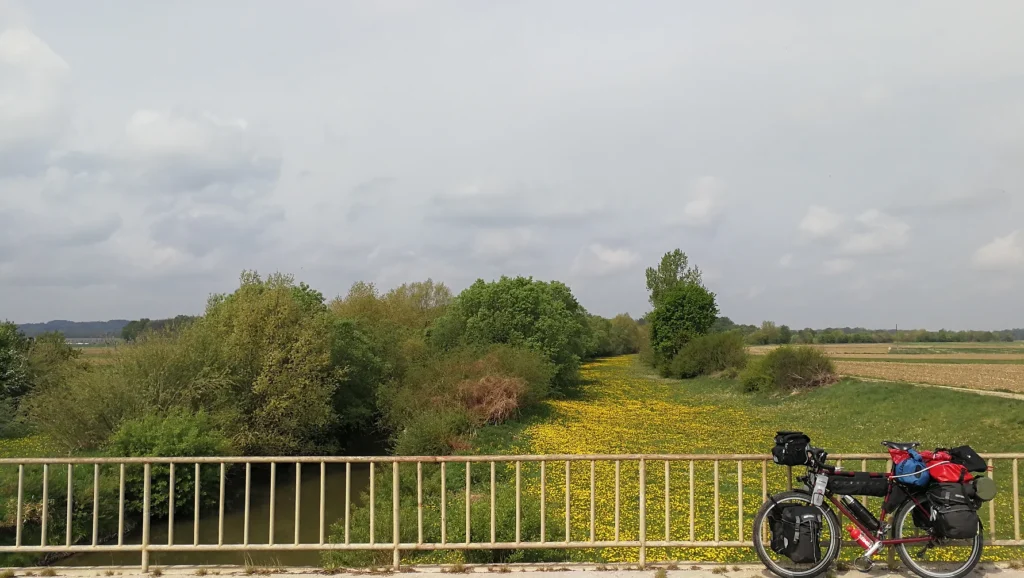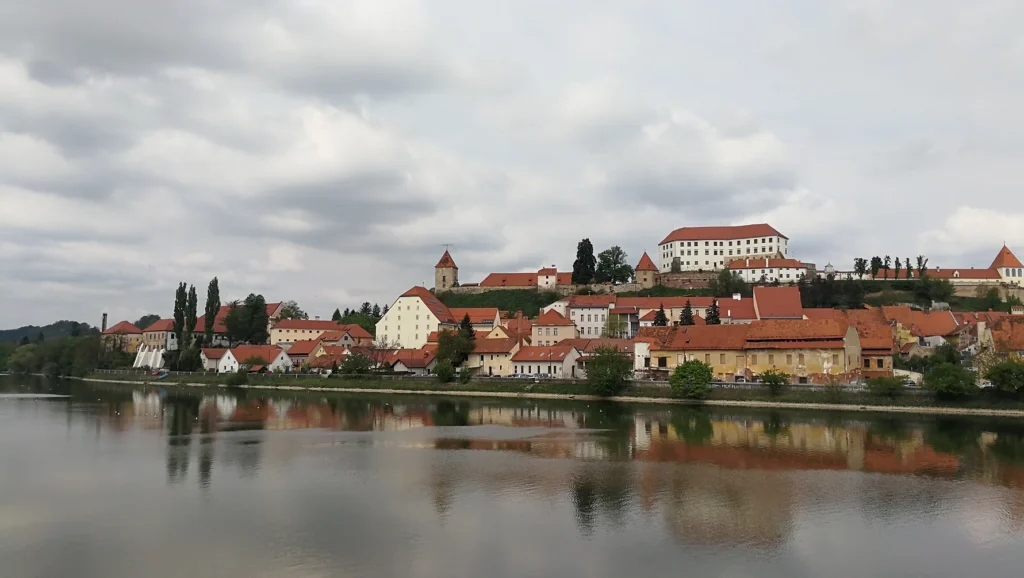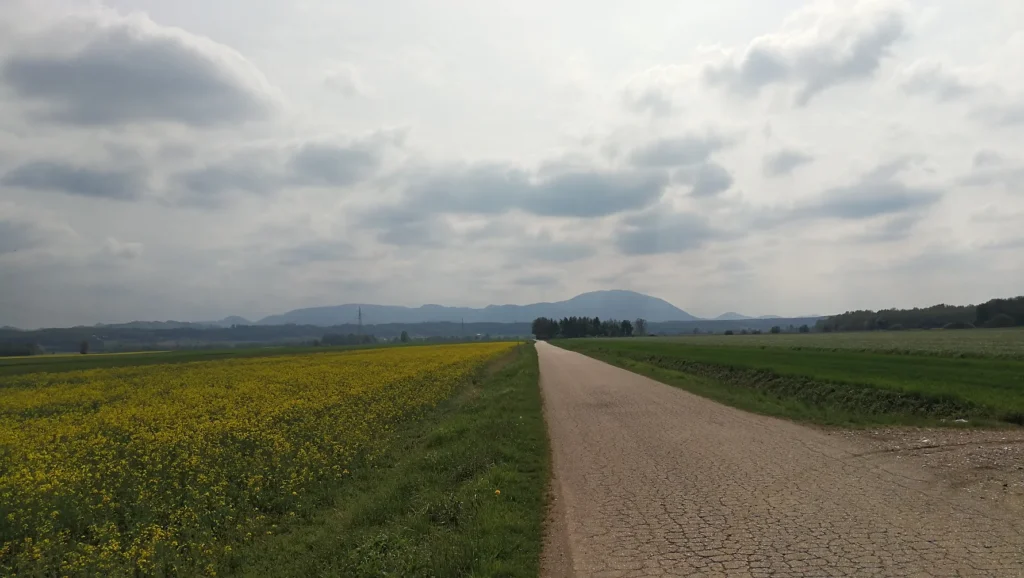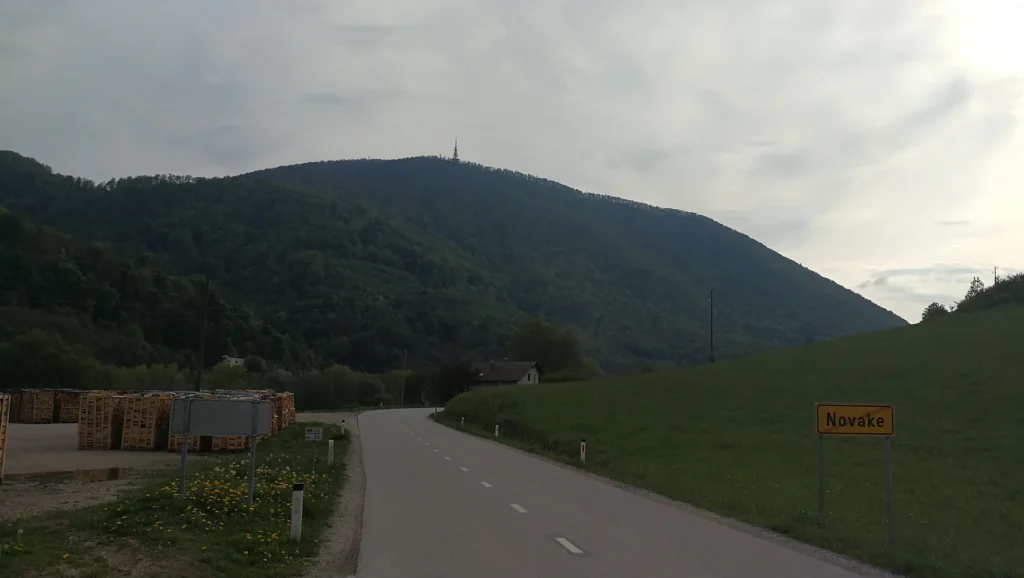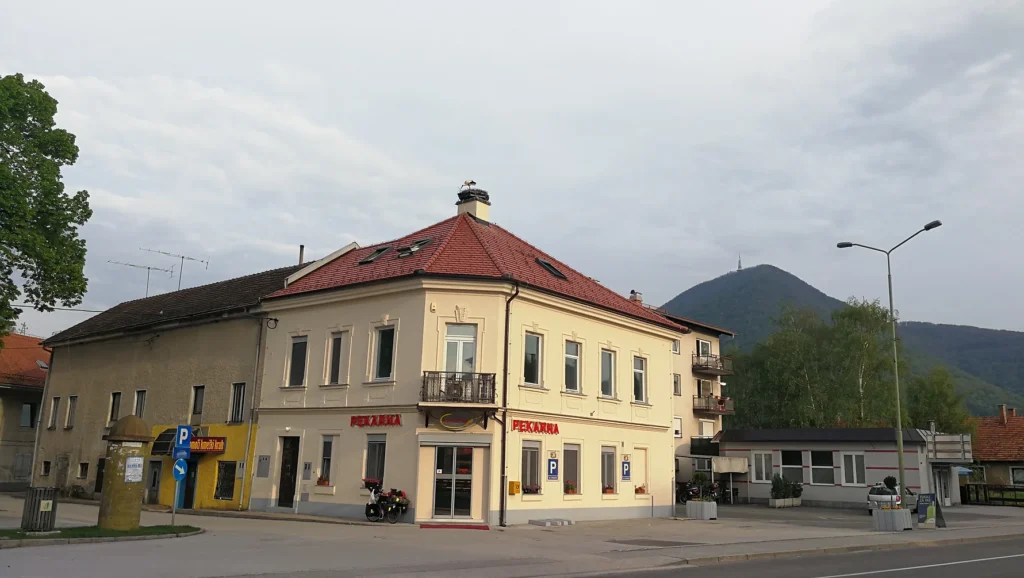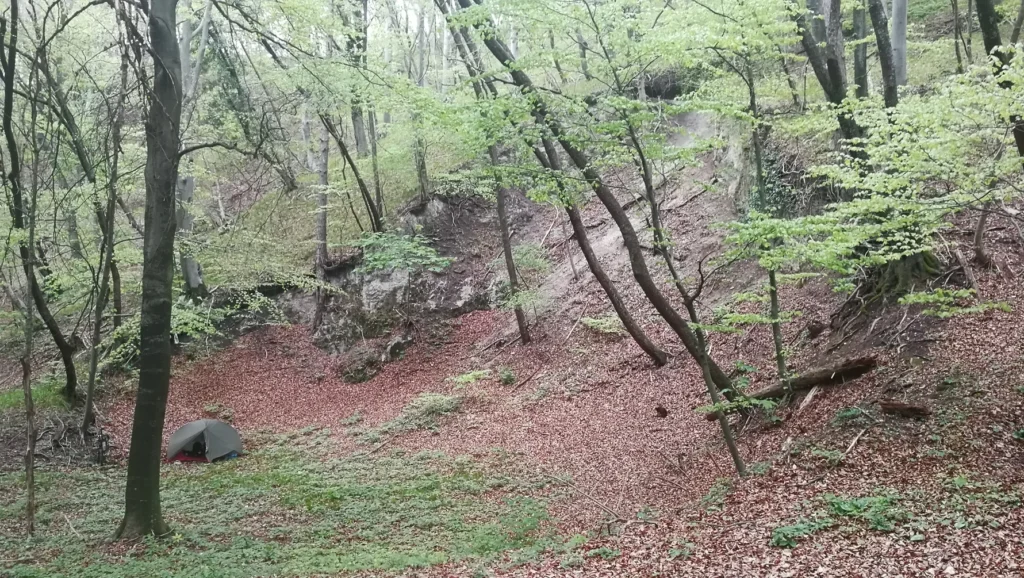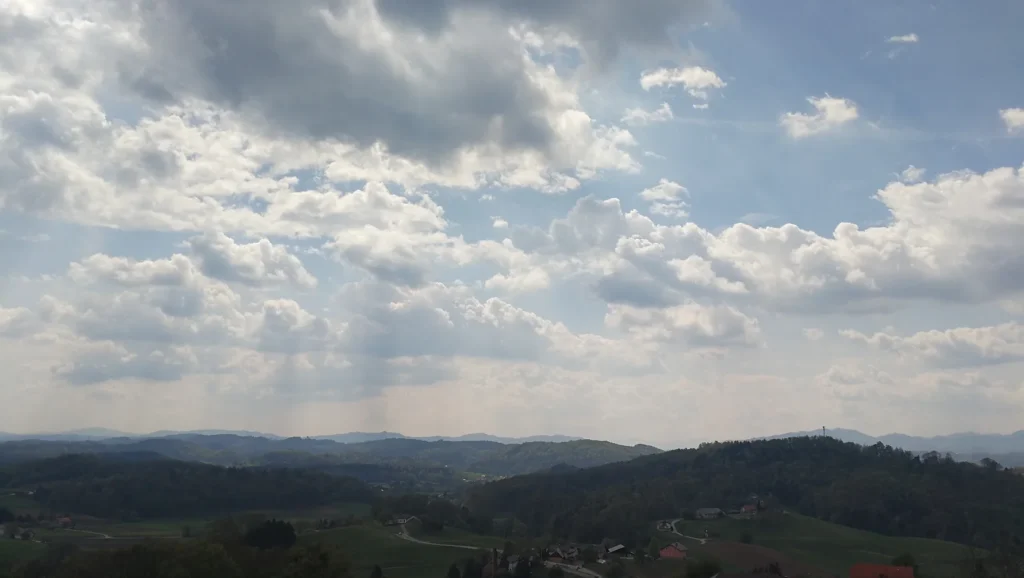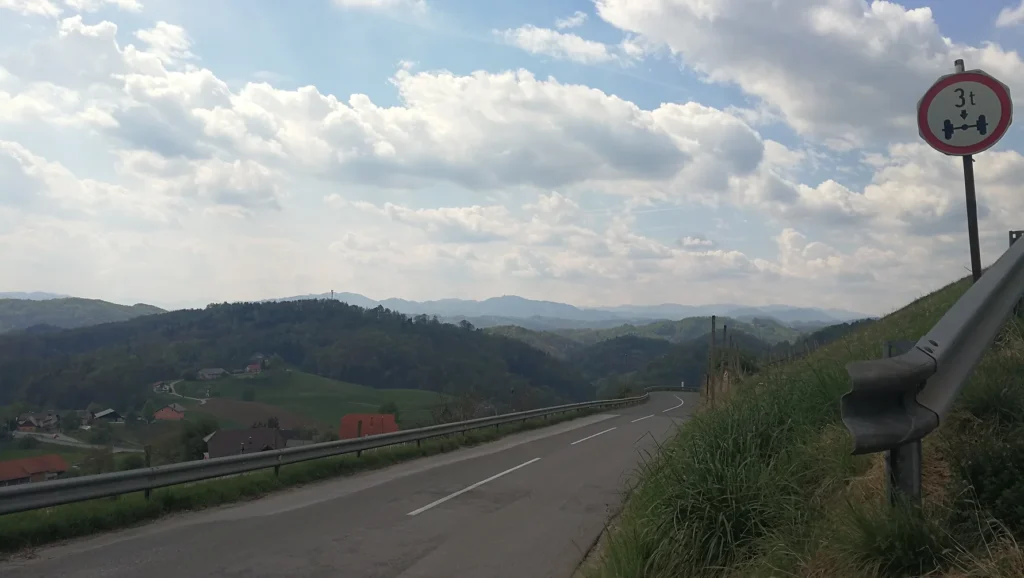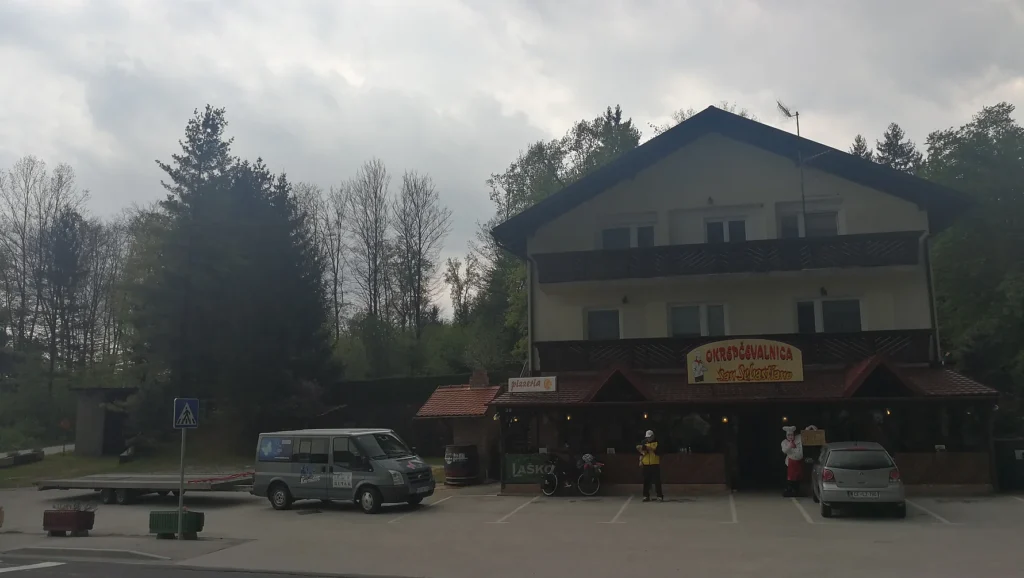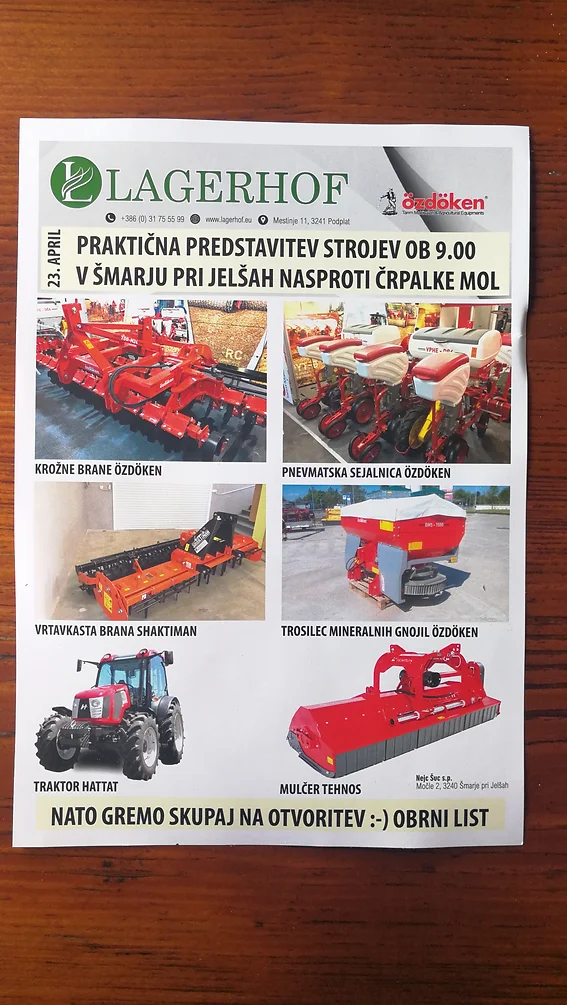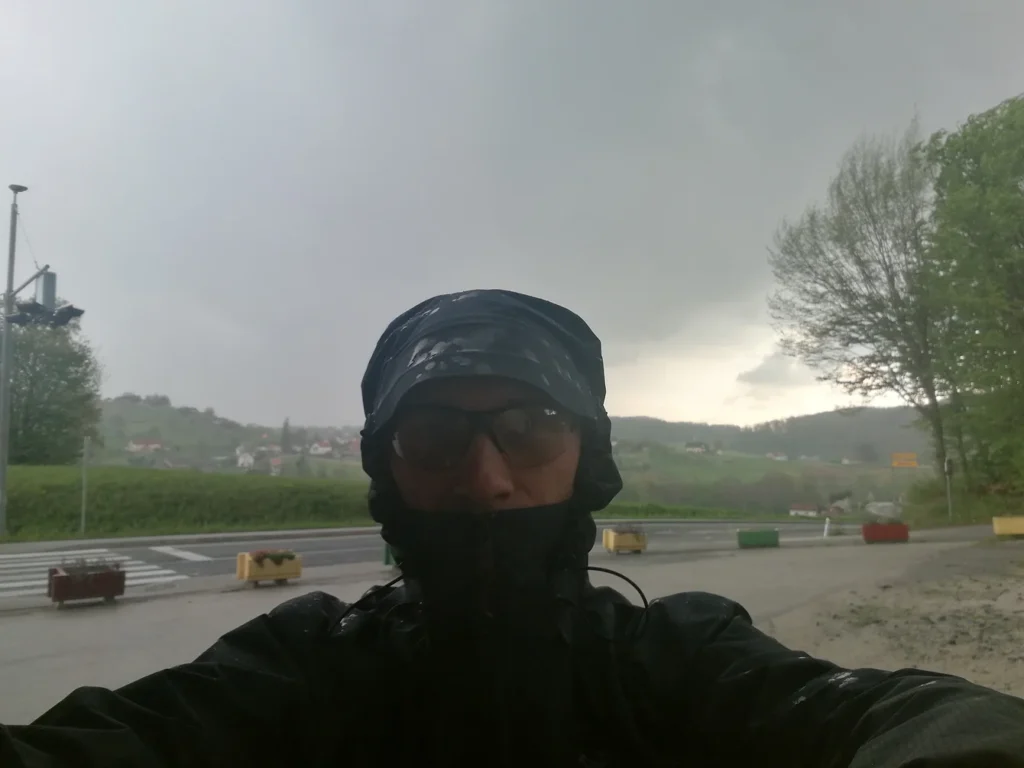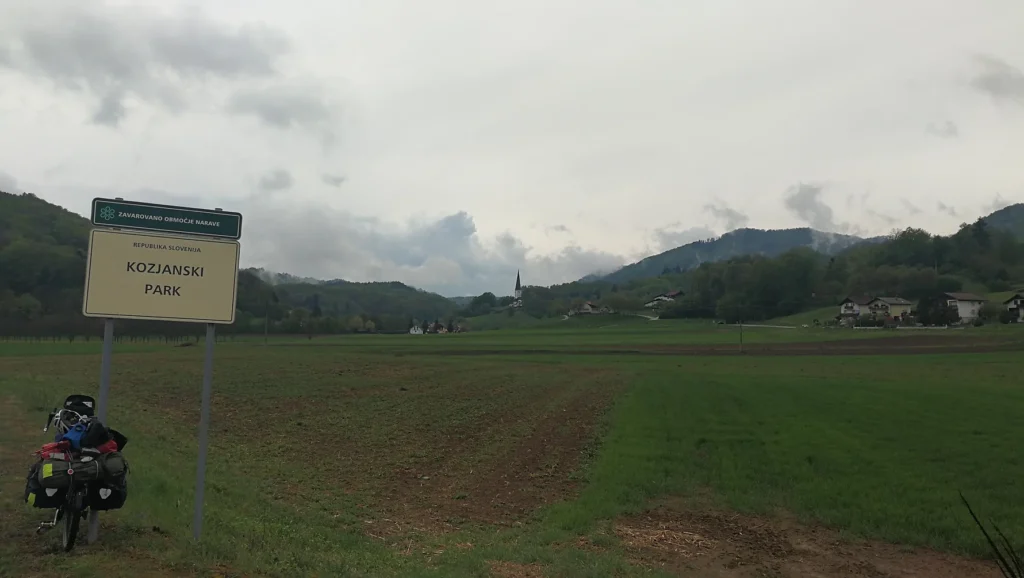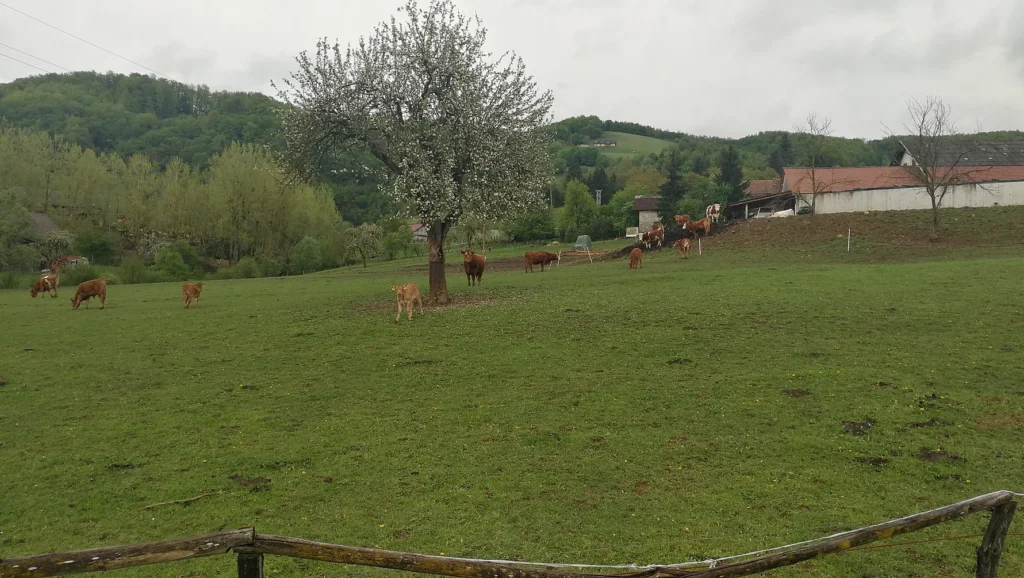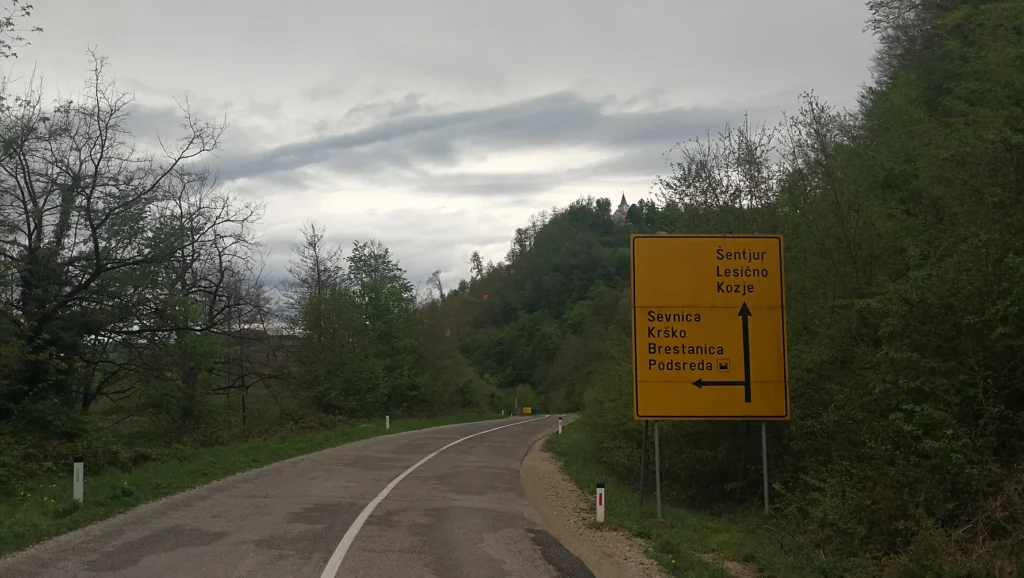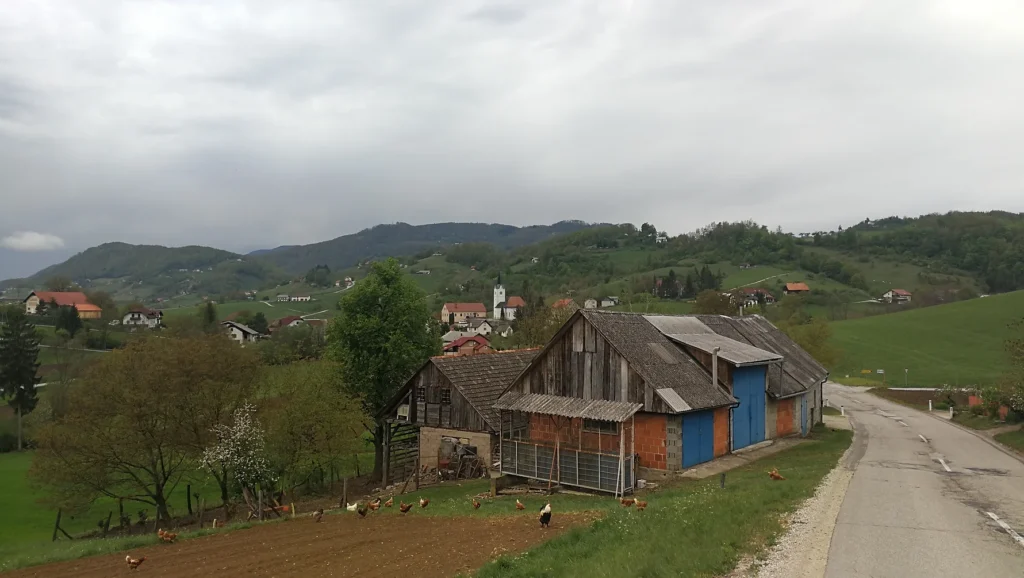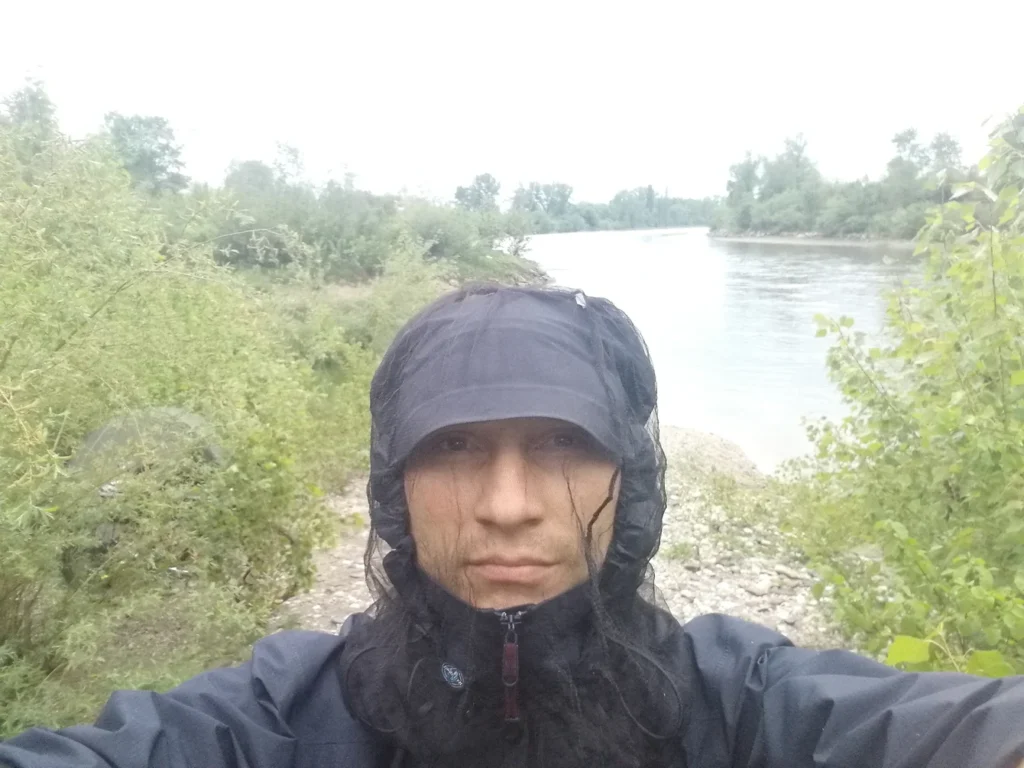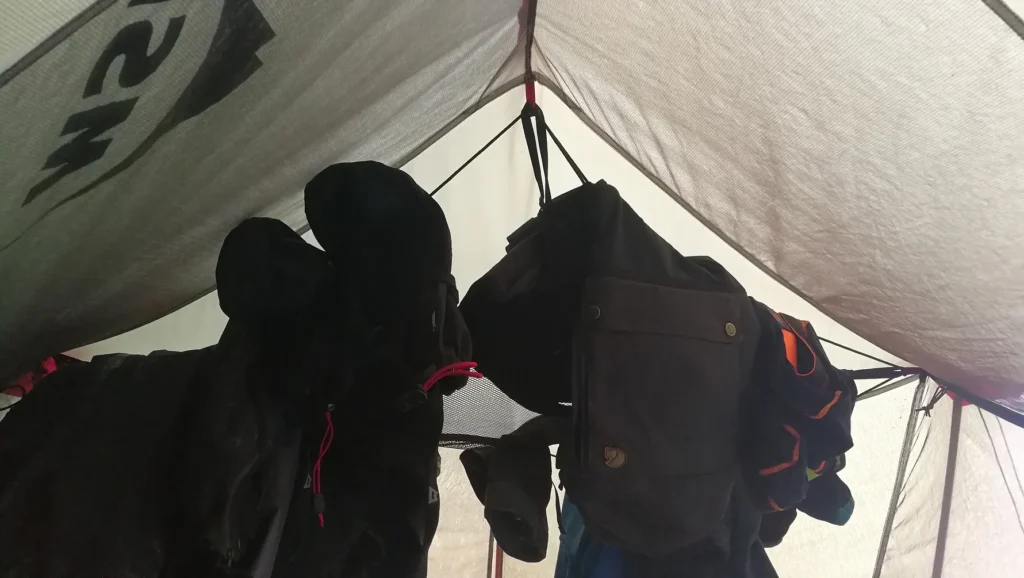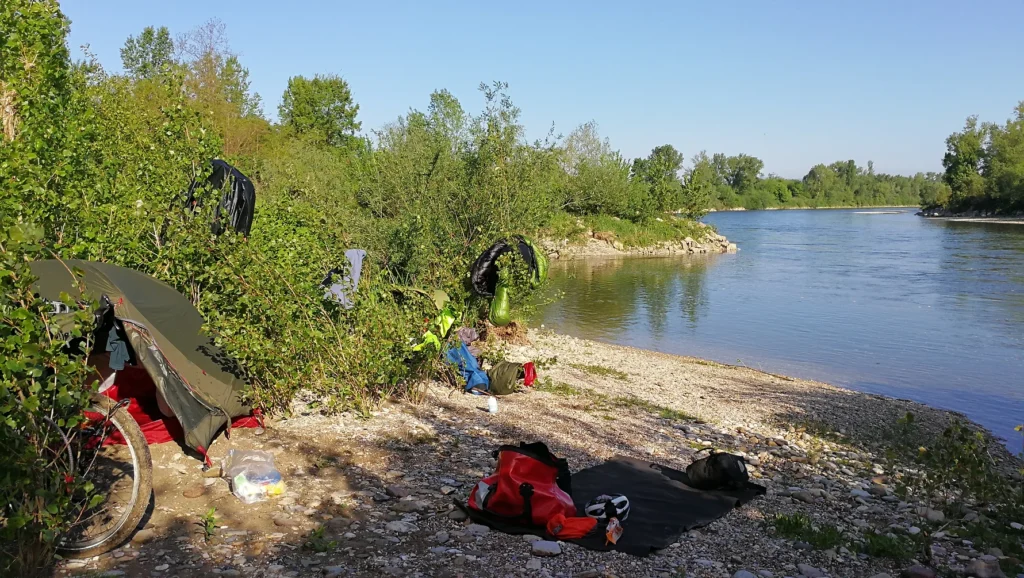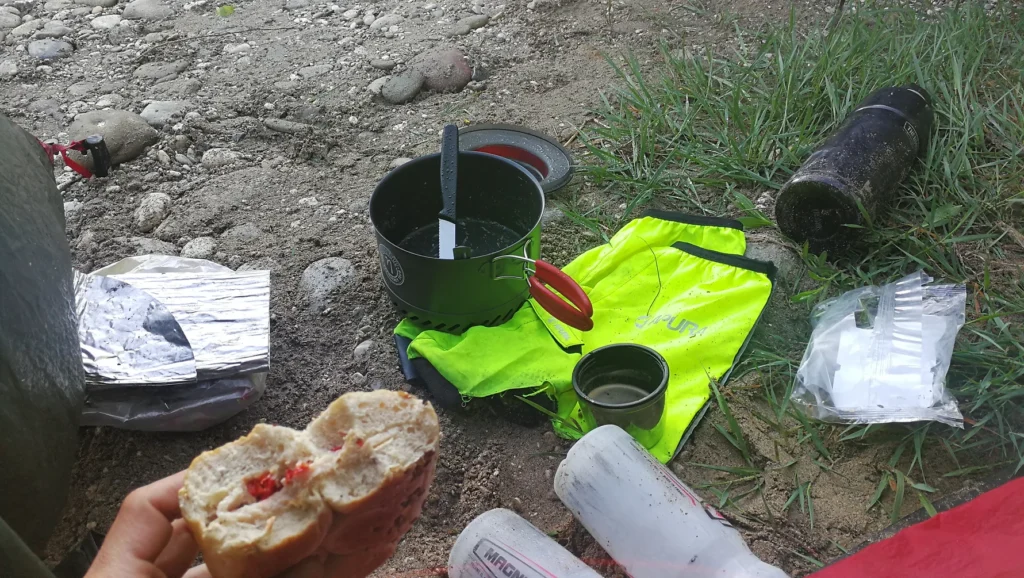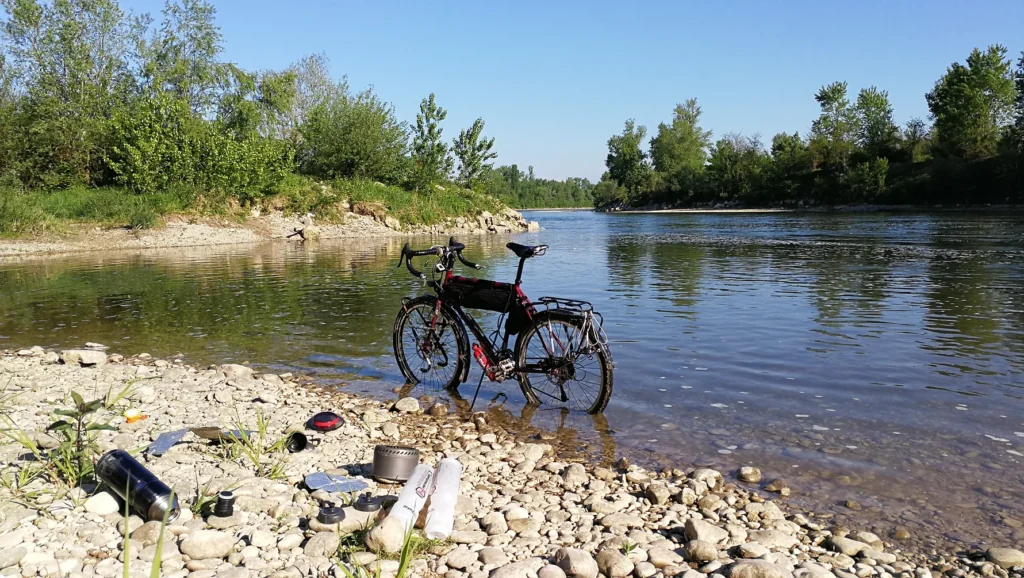Slovenia — Integration
Around noon I reached the border crossing from Hungary to Slovenia. Nobody around.
Within the first minute cycling in Slovenia I broke my tour high speed record. The road was perfect for 3 km but then switched back to worn-out tarmac.
The color of village signs changed from white to yellow. I love how the EU countries maintain their traditions: “United in diversity” is the official EU motto reflecting a united collaboration for peace and prosperity while maintaining the diversity of the member states.
Perhaps this motto is transferable to the realm of consciousness?
Some sun in the afternoon but increasingly cloudy in the evening – it felt like rain was coming.
Heavy rain at night, peaceful and fresh.
In this camp I regularly heard loud bangs nearby. Perhaps an agricultural scare gun system to scare away animals from fields?
Today’s cycling featured a mix of flat countryside and hilly forests. After the rain last night I was happy to cycle in dry conditions.
I cycled through the city of Ptuj which reminded my of Würzburg in Germany. Ptuj is Slovenia’s oldest city with archaeological evidence from the Stone Age, the Celts from the Iron Age, and the Romans who mentioned Ptuj in written records already 2,000 years ago. The city lays between wine-growing hills at the River Drava. Würzburg also had settlements from the Celts and Romans and similarly lays between wine-growing hills at a large river.
Today I missed my family and wondered why. Was it because the similarity of Ptuj and Würzburg triggered a family association as Würzburg is home to a part of my family? Was it because the Easter weekend triggered family memories of being together in the garden chasing eggs? Or was it due other factors or possibly a combination of many factors? I didn’t know.
Do you know how your consciousness works?
Do you know how your emotions work?
To me it seems that our emotions float around our consciousness like multidimensional clouds interwoven in many layers of complex dependencies. And somehow our emotions also seem to be able to move across realm and time.
So if we have unprocessed emotions for whatever reason … what can help?
First, I think it’s healthy and constructive to accept that all our emotions and emotional blockades exist for a good reason. When life tests us with emotions we suppressed, this is exactly the point in our life where we grow. It’s a natural process, it’s how our human existence works.
Second, I think given that our emotions float around our consciousness like multidimensional clouds, we probably shouldn’t try to grasp them with our linear thinking cognition. All those nice little words in our mind constructing causalities among emotions and other analytical objects can prevent us from really feeling our emotions and integrating them.
As a disclaimer I should say that my personal subjective reflections on emotions are only based on the direct observation of a single consciousness which is mine. But then again that’s the case for any other human on this planet.
I think you, I and all our fellow human brothers and sisters are equally philosophers of our own consciousness – no academic degree required, everyone naturally reflects on themselves as part of the human condition.
So dear reader … what’s your perspective on the emotions you have inside your consciousness? How do you handle it when your life path serves you an emotional blockade?
One thing I like about the human consciousness is how existentially free we are regarding the attitude with which we accept things. What’s an emotional blockade in the first place?
“Blockade” is a term a find suitable to describe the absence of a free flow of our emotions. But I’m not using the term to indicate something negative like a “problem”. Blockade is just a placeholder word and not the real thing anyways.
Yes, an emotional blockade is a hurdle, an obstacle, a test, something that requires some time to overcome. But given the constructive learning potential contained in every life situation, an emotional blockade is always also a gift, an invitation, an opportunity-to-grow. Sounds cheesy and has been said a million times before … but it’s most definitely true.
I believe we all can freely choose to be intimidated by our blockades, or we accept them with a sporty attitude. Think about how powerful you are given this choice.
And our attitude makes a big difference in shaping our life. Accepting our emotions and blockades fully and with a compassionate attitude is already a big step forward towards their integration.
Life is happening to us 24/7 from cradle to crave. Life is like a non-stop reality show where we are the first-person player constantly making choices. We can’t escape our freedom to have an attitude towards our emotions and we all have one.
And if our attitude has so far been subconscious, we can decide to bring it into conscious awareness and form it.
Every time we accept and integrate a previously unprocessed emotion we somehow seem to become more experienced and stronger. Our life is a series of emotional training opportunities-to-grow if we choose this attitude and then execute accordingly.
In the evening I was low on food and hungry and thought in this catholic region everything would be closed. But then in Poljčane the smell of fresh baking goods caught my attention cycling by. Luckily I trusted my nose and discovered a bakery full of delicious baking goods.
With dinner in my bags the only remaining question of the day was where to sleep. I decided to pitch camp in Boč-Donačka gora Landscape Park which forms the eastermost part of the Karawanks mountain chain which runs 120 km through Austria and Slovenia.
Geologically this is a karst area without surface rivers as the water here quickly disappears through the dissolving rock structure. On the one hand this meant I didn’t find a real stream and had to filter water from a questionable small canal by a road. On the other hand the area was full of interesting rock formations.
The camp spot was situated on a small plateau and to get there I waded through a narrow ravine. And with about 20 cm of dry leaves under the tent, I slept like on a foam mattress.
Today I cycled up and down many, many hills.
Slovenia is a hard country to navigate. I feel like I have checked my navigation as often today as in the rest of my tour combined. While other countries usually have clear primary, secondary, and tertiary roads, Slovenia just seems to have an asymmetric spider web of tertiary roads.
It’s usually unclear where and what towns are on the map, at least in the hills. As a cyclist thinking about up/downhill riding it would be nice to access the bike-route planning algorithm of my offline maps. Going from A to B, do I want ride left 30 km with elevation x or right 40 km with elevation y? The algorithm makes that choice when suggesting a “bike route” but I would like to set those parameters myself. Whatever … even though it was unclear how the algorithm worked it worked good enough to guide me towards the Adriatic Sea.
Easter Sunday became visible when I cycled repeatedly past groups of people aggregating at Jesus and Madonna statues with Easter baskets. Perhaps they ask for a blessing?
Food-wise everything was closed except for San Sebastiano who serves delicious pizza. I chatted for a while with Franc who fought as a partisan in the Yugoslavian war and now trades farming machines. He just came back from Turkey where he had bought one with his trailer.
Franc spoke fluent German and a couple of other languages too. He is an interesting guy and bought me a coffee while we chatted about the world. “When I was in Berlin in 1969…” he knows stories you could listen to forever. He also seems to know the entire Balkan and gave me several good route recommendations.
He also gave me flyers to distribute along my onward route to make marketing for his business which I happily did. Tractor Hattat costs 10.000 Euro – such machines cost half in Turkey compared to local prices thus even with import tax, vignette and fuel, it’s a good deal to make the trip.
Heavy rain in the afternoon. Since two days I regularly hear super-loud “bangs” which apparently is a Slovenian Easter tradition. Like new year firecrackers just much louder. They shoot with gas I assume.
Are our attitudes towards accepting emotions and external conditions related? If things are what they are (e.g. rain) it’s probably generally wise to accept what is and make the best of it.
When we accept our direct psychosomatic feelings we do something powerful: it means we are authentic and integrate our emotions instead of suppressing and running away from them.
Thinking “about” our emotions is definitely not enough to truly integrating them. We must accept our individual life path and emotional biography not just analytically but rather directly and unfiltered. If we have lost the connection to our body and emotions we can learn to feel again – I believe that all of us can do this.
Thus to integrate emotional blockades we must focus more on our direct non-cognitive energetic experience inside our consciousness, and less on our cognition “commenting” on our feeling experience in words.
I think we all can teach the cognition within our consciousness to speak less loud, to listen more, to let go of our reflex to take control, and to generally trust more into our feelings. What’s your perspective?
You are a “consciousness philosopher” too, dear reader. Everybody is self-reflecting, at least subconsciously – I’m sure I could learn a lot from you.
Many consciousness ingredients could help to integrate emotional blockades but every human emotional biography is unique so I believe there can’t be general rules – the emotional blockades you carry inside yourself are different from mine.
I’m just a cyclist but across individual life paths I think three things generally help to integrate emotions:
Self-compassion: Yes, we all suffer and we all have anger and fear inside sometimes and it’s ok. It’s called being human and having a life. And given that emotional blockades are part of the human experience, we might as well relax into them with compassion … why fight this part of our reality?
Perhaps self-compassion can be supported by the general attitude we choose towards ourselves. For example, when we regard ourself as a loved friend we automatically treat us more compassionate and forgiving.
Honesty: Yes, it’s sometimes hard to be completely honest with ourself. But probably we have to accept our emotions fully even where the learning temporarily hurts in order to move forward with our life and grow.
Honesty definitely means accepting our individual pain as we can’t force us to have only emotions around happiness all day. But whenever we let painful emotions arise and feel through them, we all somehow seem to become stronger.
Ownership: Yes, the reason we have emotional blockades is often other people. But the only person on this planet who can actually integrate your emotional blockades is you.
We are free to shape our consciousness and at the same time we are the only person responsible to do it – and we are also the only person who can have some fun along the way.
Breathing in, breathing out.
Shall I go straight towards Kozje or left towards Podsreda? Life is a stream of decisions we constantly make in our consciousness and we all make many navigation decisions in our daily life.
I believe across all ideas on helpful consciousness ingredients there is a key meta-thing required to unfold their potential: practice.
Whether it’s cultivating a generally accepting attitude towards our emotions, non-grasping them cognitively, or allowing us to truly feel our body – we have to practice these ideas over time to unfold their power to integrate our blockades.
Having heard ideas like “self-compassion, honesty and ownership” doesn’t benefit us much without practice.
Remembering such ideas all our life as abstract concepts and thinking about them daily also doesn’t unfold their powers.
What helps is practicing those consciousness ingredients regularly. Really meaning it, really letting some of our energy flow into these concepts to fill them with life.
Practice in turn can be supported by habits we choose to establish and maintain. I think also here human emotional biographies are too diverse for general rules … but across individual life paths I believe the following habits generally help:
Allowing us time to regularly feel is essential. When was the last time you sat for 5 minutes offline and undistracted paying conscious attention to what you were feeling?
Giving our breathing attention is probably helpful too as it’s an indicator of our emotional state. If we have blocked emotions our breathing may have become shallow whereas when we are fully integrated we breathe naturally and unrestricted.
Giving our body attention seems to make sense as well given that it mirrors our emotions – modern neuroscientist emphasize that our consciousness is deeply embedded in our biological cell pile. When you put your hand on your belly and breathe, you can feel it.
I’m just a cyclist and nothing of this is new – people have been discussing these ideas across cultures and time. I echo these ideas to give them the respect they deserve, also because I think that it’s healthy when we share with each other things that work … personally I needed to hear and practice these things many times before I got it.
It also took me quite long in my life to realize how I got conditioned as a man. “Be tough”, “men don’t cry”, “men don’t have feelings”, “men are rational” – often heard in our society … but really unhealthy advice.
Today I cycled a solid 100 km given the hills and rain. I pitched camp close to the Croatian border at the mighty Sava river.
A million mosquitos can go fuck themselves because when they come out, I’m already there waiting.
The morning was quite hot so I happily moved the ongoing drying-stuff-game outside my tent.
Breakfast consisted of a crappy gas station sandwich as yesterday I couldn’t find an open shop.
Practice means growth – I believe we all can grow much larger than we currently think we can … the trick is to not believe the subjective limitations our conditioned mind tries to tell us.
An ultrarunning race director put it this way:
“You’re better than you think you are. You can do more than you think you can.”
Believing that we can grow into a chosen life direction generally creates new possibilities – and we probably also integrate our emotional blockades better when we belief that we can.
Do we have to really “do” something at all? Perhaps emotional integration, just like life in general, is functioning best with the right balance between “doing” and “letting happen”.
For the moment I believed that sitting at the shore of the Sava river and thinking about nothing brought me joy. I cleaned my bike by the river and the sun was so strong that I thought about riding in shorts for the first time since leaving Berlin.
Slovenia, thank you for the hills, rain, and other inspiration on acceptance and integration. Perhaps acceptance is generally a good idea for consciousness exploration even when, or perhaps exactly when, stuff hurts.
Time to cycle into Croatia – I had visions of beaches and Adriatic summer life …
